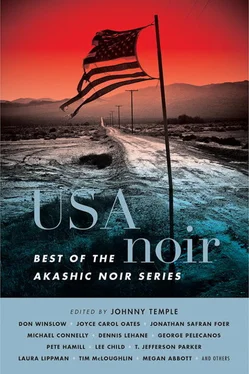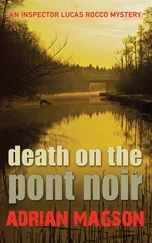Johnny Temple - USA Noir - Best of the Akashic Noir Series
Здесь есть возможность читать онлайн «Johnny Temple - USA Noir - Best of the Akashic Noir Series» весь текст электронной книги совершенно бесплатно (целиком полную версию без сокращений). В некоторых случаях можно слушать аудио, скачать через торрент в формате fb2 и присутствует краткое содержание. Город: New York, Год выпуска: 2013, ISBN: 2013, Издательство: Akashic Books, Жанр: Триллер, Детектив, на английском языке. Описание произведения, (предисловие) а так же отзывы посетителей доступны на портале библиотеки ЛибКат.
- Название:USA Noir: Best of the Akashic Noir Series
- Автор:
- Издательство:Akashic Books
- Жанр:
- Год:2013
- Город:New York
- ISBN:978-1-61775-189-9
- Рейтинг книги:3 / 5. Голосов: 1
-
Избранное:Добавить в избранное
- Отзывы:
-
Ваша оценка:
- 60
- 1
- 2
- 3
- 4
- 5
USA Noir: Best of the Akashic Noir Series: краткое содержание, описание и аннотация
Предлагаем к чтению аннотацию, описание, краткое содержание или предисловие (зависит от того, что написал сам автор книги «USA Noir: Best of the Akashic Noir Series»). Если вы не нашли необходимую информацию о книге — напишите в комментариях, мы постараемся отыскать её.
USA Noir: Best of the Akashic Noir Series — читать онлайн бесплатно полную книгу (весь текст) целиком
Ниже представлен текст книги, разбитый по страницам. Система сохранения места последней прочитанной страницы, позволяет с удобством читать онлайн бесплатно книгу «USA Noir: Best of the Akashic Noir Series», без необходимости каждый раз заново искать на чём Вы остановились. Поставьте закладку, и сможете в любой момент перейти на страницу, на которой закончили чтение.
Интервал:
Закладка:
It was true. It had been Freddie’s idea, but Bobby had tried to paint it like it was Tiny’s doing. Cunningham said it didn’t matter whose idea it was. They had stolen Second Chance together.
Da Cunha released Tiny, who rolled on the ground. Stubby appeared. He and Da Cunha went out toward the water, after Freddie.
“What’s a Pukwudgie?” DeShawn asked.
“Come on,” Cunningham said. “Time for a little island history lesson.” Cunningham gave Tiny a hand, helping him up. He wrapped his arm around Tiny, and led the rest of us up the hill. As we rounded the graveyard we could hear Freddie’s shouts of “Feck you, you feckin’ narc, Tiny!” go by on the wind.
The stone ruins of the leper colony looked like the bones of a giant that had been buried there and gradually unearthed. As soon as we passed them for the windward side of the island, the seagulls that had been trailing us dropped off. The wind started to howl and whine.
Ryan and Kevin went back cause they were on the evening’s cook shift. DeShawn gave me a look like he didn’t want to walk back with Ryan, who was nothing but a snot-nosed pain in the ass, or Kevin, who was bound to do something stupid like walk us off a cliff. Maybe he was also scared that Freddie was still running around with that axe. No matter. I could tell by the way Cunningham had his arm around Tiny that he wasn’t going to let him go anywhere. This walk was for Tiny. Maybe I knew it was also for me.
I put up my hands as we crashed into that girl’s car, but I could still see her face. Her body jackknifing. Her head and chest flying over the steering wheel, toward the windshield.
They call it safety glass because when your head hits the windshield it shatters but stays in place so that it catches you, like a net. If that fails, and you’re airborne, it crumbles like a cookie so you don’t get cut. But chunks of metal went flying. That girl didn’t stand a chance.
Sometimes I feel as if I’m made of safety glass, as if everything inside me has shattered yet somehow stays intact. But Chad was all cut up inside, like that broken beer bottle, which sliced up his face.
Everything would’ve been okay if I hadn’t handed Chad that beer.
Cunningham took us to a crumbling stone courtyard that gave us a little protection from the wind. Me, Tiny, and DeShawn sat down on some old stone benches where we could see the water and some lights from New Bedford, on the other side of the bay. Cunningham cleared his throat, like he had been practicing some speech he’d prepared.
“After the leper colony closed, a caretaker lived out here with his wife and two sons. They were the only people on the island. Then one of the kids killed the other. They said it was a freak accident, but anyone who knew this place and that family knew the truth. It was because of the Pukwudgies.
“The Pukwudgies were these little demons, no bigger than your hand, that made the Wampanoags’ lives miserable. They broke their arrows, bored holes in their canoes, and ruined their crops. It would not be inaccurate to say they were the Wampanoag equivalent to having a seagull defecate on your head, but as tiny as they were, they had great power over the Wampanoag giant Moshup and his sons.” When he said “giant,” Cunningham shot Tiny a meaningful look.
“One day, Moshup declared war against the Pukwudgies. He gathered his sons and set out across the Cape to hunt them down. At night, while Moshup and his boys were sleeping, the Pukwudgies snuck up on Moshup’s sons, blinded them, and stabbed them to death. Moshup buried his sons along the shoreline. He was so aggrieved he covered their gravesites with rocks and soil to create enormous funerary mounds. In time the ocean rose, carrying the mounds—and the boys’ remains—to here. All the islands here in Buzzards Bay—Naushon, Pasque, Nashawena, Cuttyhunk, and Penikese—are what remains of the great giant’s sons.”
The wind was threading its way through the holes in the stonework, curling itself around us, sliding across the backs of our necks.
“You mean we’re sitting on some Indian grave?” DeShawn asked.
Cunningham nodded. DeShawn shuddered.
In the silence, you could hear the ocean churning underneath the wind. That was when I heard what sounded like a small mewling thing. I looked around. DeShawn caught my eye and nudged his head over toward Tiny who started bubbling up like a hot two-liter that had just been cracked open. “She-she-she—”
DeShawn scratched at the ground with a rock. It smelled like fresh dirt.
“I didn’t mean to hurt her,” Tiny gurgled. “I loved her.”
Tiny was now going like a geyser. I just kept watching the water, the blackness moving out there, flashing like silver in the moonlight.
“I liked her so much.”
DeShawn looked like he wanted to dig his way to China with that rock, anything to get out of there. Then he suddenly stopped, like he remembered he was digging on someone’s grave. He sat on his hands and glanced away.
Tiny curled up in a ball and put his hands over his head, as if he was scared he was gonna get hit. Cunningham scooped him up like Santa Claus picking up some big fat kid who was crying because he wanted a new fire truck, only it wasn’t a truck Tiny wanted. It was a new life. That was all Tiny wanted. At age seventeen.
The world is full of people like us. Floating out here like these half-sunk islands covered in shit. We’re drifting through your city, your town, cutting across your backyard, walking up your fire escape, sliding a slim jim between your car window and door, slipping into your leather bucket seats that smell like money—your money. We’re wiring your ignition, busting your satellite radio, rifling through your shit, tossing out manuals and hand sanitizer, tissues, registration, and pens, until we find that emergency envelope full of freshly printed twenties. We coast along your streets, caught up in the current of something swirling inside us, riding swells of blacktop anger with the wind at our backs. We don’t really want your car, your daughter, your jewelry, your things. Just like with you, that shit helps us forget why it can hurt to be alive, but only for a little while.
We snuck away, DeShawn and me, leaving Tiny to be lectured by Cunningham about “crossing the treacherous waters,” “a new day dawning,” and “making the journey called Second Chance.” Somewhere behind us on that dark path, we could hear Tiny say he wanted to be different, but he just didn’t know how. He just didn’t know how, he repeated again and again, the sound of his voice echoing in the wind.
Later that night, we could hear Tiny crying himself to sleep, rocking back and forth. It was like we were all at sea, rolling through the waves of regret crashing around inside him.
“Feckin’ A,” Freddie said. “Feckin’ knock it off, you pansy.” Freddie had calmed down since earlier. At dinner that night he was so cool it was spooky, like Stubby and Da Cunha had worked him up something good.
“Shut up,” DeShawn said. “I’m sick of you and your freak-ass shit.”
“Yo, homes,” Freddie said. “I didn’t mean nuthin’ by it. You and me, we’re cool, a’ight?”
“No,” DeShawn answered. “We ain’t never been cool.”
We had all been pretending to be asleep, just waiting for Tiny to knock it off, which he did, eventually. Then the house slowly quieted down as the other guys stopped tossing and turning and dozed off for real. But after all of Tiny’s tears, that silence kept me awake.
I stared out the window and watched the moon rise higher like a giant eyeball staring out over the hill where the leper cemetery was. In the silence, I could tell someone else was awake and knew I was up too. And he—or it—was just waiting for that moment when I would fall asleep. I lay as still as possible and listened to the waves against our island rock. It was like we were part of some cycle of nature, meant to crash up against things forever.
Читать дальшеИнтервал:
Закладка:
Похожие книги на «USA Noir: Best of the Akashic Noir Series»
Представляем Вашему вниманию похожие книги на «USA Noir: Best of the Akashic Noir Series» списком для выбора. Мы отобрали схожую по названию и смыслу литературу в надежде предоставить читателям больше вариантов отыскать новые, интересные, ещё непрочитанные произведения.
Обсуждение, отзывы о книге «USA Noir: Best of the Akashic Noir Series» и просто собственные мнения читателей. Оставьте ваши комментарии, напишите, что Вы думаете о произведении, его смысле или главных героях. Укажите что конкретно понравилось, а что нет, и почему Вы так считаете.












